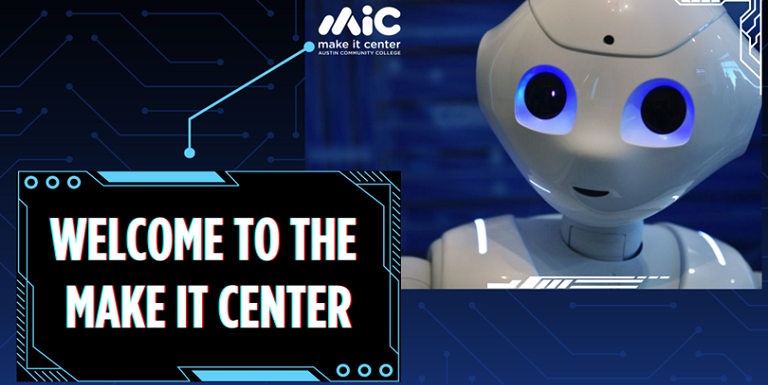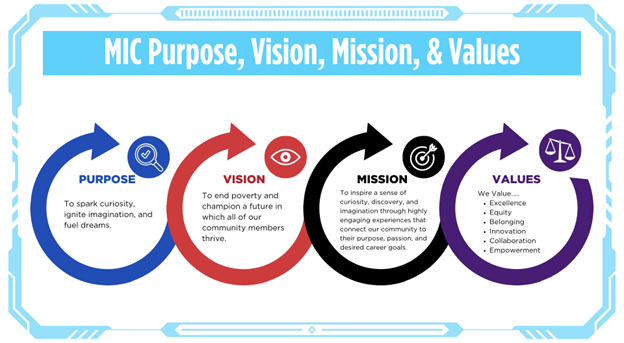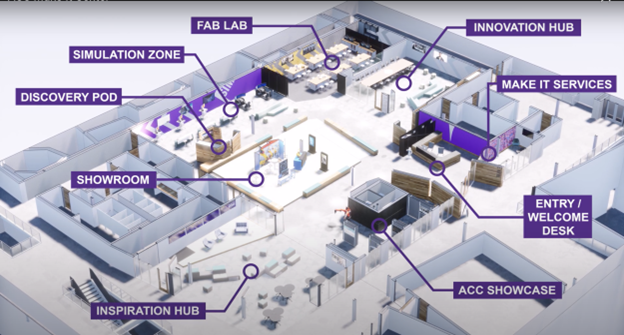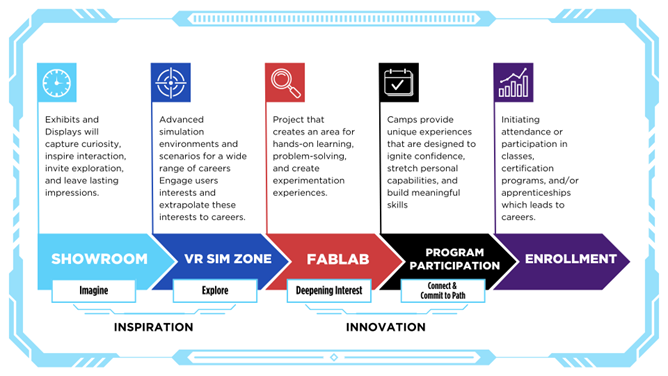The Make It Center: Career Exploration Today for Tomorrow

Imagine a place where individuals of all ages and their families can come for the ultimate hands-on career exploration experience. At Austin Community College’s (ACC) Make It Center (MIC), the possibilities are boundless. This innovative new hub will revolutionize the way we perceive career pathways by introducing visitors to a multitude of options they may have never considered before. Through dynamic partnerships and collaborative efforts, the MIC will inform, inspire, and captivate students and community members alike, empowering them to uncover meaningful careers that align with their passions, strengths, and interests. In partnership with the Make It Movement, whose goal is “to help young people discover their purpose and talents early in life so they are confident about making a great living and life doing what they love to do” (Make It Movement, n.d., para. 2), the MIC will expose our community to a world of high-skill and high-income careers.
In this era of rapid technological evolution and the rise of artificial intelligence (e.g., Chat GPT, Microsoft Copilot) as well as disruptive changes in education and the workforce, we find ourselves at a critical juncture—a time when we must be adaptable and innovative to address the ever-changing needs of our students. ACC’s Chancellor, Dr. Richard Rhodes, emphasizes that innovation plus collaboration equals transformation, and the Make It Center is a perfect example of this. In a world where technology is taking off like no other time in history, and in a society that is more diverse than ever before, educators and the workforce will need to find creative ways to show the current and future generations what work looks like today, and what it is evolving into tomorrow.

The MIC Purpose
The MIC will provide the ultimate hands-on career exploration experience, exposing visitors to a myriad of career pathways. Collaborative partnerships and engaging experiences will inform and inspire students and members of our community and help them discover career pathways that lead to well-paying and in-demand jobs. The MIC will partner internally and externally with organizations like E3 Alliance (n.d.) that are establishing “measurable objectives to improve student outcomes and decrease inequity across the cradle-to-career pipeline” (para. 3) in hopes of providing opportunities for every individual looking to improve the future for themselves and their communities.
This new center will ensure equitable access by allowing anyone interested to discover the career paths that match their individual strengths and passions. For many people, because of variables such as race, ethnicity, gender, and ability, an understanding of what career opportunities are available to them is limited to what they see on TV or social media. The MIC is leveling the playing field and helping each person who walks through our doors find their purpose in life. Clarity of purpose can drive commitment to an educational journey and career that enhances the future for individuals, families, and entire communities.
During our soft opening in the past few months, we have witnessed the MIC’s potential. Although the official public opening is planned for fall 2023, we have received more than 50 requests for events and tours, and have already successfully hosted several activities, including:
- A Junior Achievement Finance Park program for approximately 200 young adults who learned about personal financing and career exploration.
- Girl Scouts of Central Texas (GSCTX) summer camp experiences related to science and technology, robotics, sustainability, drones, and entrepreneurship. To design the programming, the MIC collaborated with academic units at the college such as Culinary Arts, Advanced Manufacturing, and Biosciences.
- Adulting 101.
- A Visual Communication Portfolio Showcase.
- The Boy Scouts of America Friends of Exploring annual fundraising event.

The MIC features distinct zones, each offering visitors and students
the opportunity to explore diverse pathways and experiences.
MIC Space Features
The MIC is a one-of-kind 10,000-square-foot space where anyone can explore the possibilities for their career journey. It is an adaptable space that allows for creativity and brings to life new ways to learn and ignite career passions.
- The Showroom will promote and highlight in-demand industries and career pathways within those industries. Exhibits and displays will spark curiosity, inspire interaction, invite exploration, and leave lasting impressions.
- The Virtual Reality (VR) Simulation Zone will facilitate inspiring, exciting, and fun simulation environments and scenarios for guests to experience a wide range of careers. The Zone will offer both 3D and 4D technology to optimize the user experience.
- FabLab will create a space for hands-on learning, problem-solving, and creative experimentation experiences. Visitors will learn and develop new skills with connections to specific jobs and careers.
- The Inspiration Hub will provide a dynamic space for robust year-round interactive and engaging programs and events. This versatile space lends itself to a variety of equity-minded programs and interactive instruction that educate, empower, and excite participants about the possibilities for a purpose-driven life and meaningful work.
- The Innovation Hub will inspire creative and critical thought, dreaming, and strategic planning in ways that promote collaboration and innovation. This technology-enhanced space will provide an environment that encourages leaders across industries to gather and imagine what the future of Central Texas will look like.
- Discovery Zone will capture attention, spark excitement, and facilitate career discovery and exploration through immersive technology such as holograms and interactive software.
- ACC Showcase will increase the visibility and awareness of ACC’s many programs of study and career pathways, and invite students, prospective students, and guests to explore and connect to programs and careers that fuel their passions and purposes.
- The Make It Community Hub will provide a shared space for the MIC’s external collaborative partners to showcase and connect individuals to resources, programs, and services that support them in reaching their personal and professional goals.
Potential Impact: Workforce Needs and Higher Education Responsibilities
In a recent Conference Board labor shortages solutions survey, national data suggest that companies are struggling to find qualified workers, with 64 percent of companies in mostly white-collar industries reporting recruiting difficulties and a whopping 85 percent in blue-collar industries reporting the same problem (Levanon et al., 2020). Across the U.S., our population's job readiness is not matching up with our educational preparedness as a whole, and for those forgoing higher education altogether, the skills gap is even greater.
The Texas Workforce Commission (2022) notes in its most recent strategic plan that the “changing labor market and robust economic growth require TWC to support employers’ needs and find innovative methods to provide training and work-based learning opportunities” (p. 10). The state’s higher education strategic plan—Building a Talent Strong Texas—outlines our workforce and higher education responsibilities and emphasizes that, since “more and more jobs require credentials beyond high school diplomas,” we must ensure that “there’s a place for all Texans in tomorrow’s economy” (Texas Higher Education Coordinating Board, n.d., para. 3-4).
The MIC aims to be a hub for workforce innovation and transformation through collaboration internally across all academic departments as well as externally with our partners. Our community-based organizations will do their part to equitably change the world we live in, and our workforce leaders will seek to find the skilled workers of today and tomorrow. The current reality is that far too many communities across the country have a growing economic segregation of the haves and have-nots. Our future economic vitality depends on how well higher education closes the equity student success gaps and, ultimately, how well we prepare our students for the quickly evolving workforce. Access to career path possibilities is the first step toward equitably addressing our diverse nation’s workforce skills gap and, most importantly, ensuring a robust economy for each of our communities, states, and the nation as a whole.
Closing Thoughts
With a vision to champion a future in which all community members thrive, the MIC will invite our entire community to deepen their engagement with career exploration, collaborate around evolving workforce needs, and build strong foundations for upward mobility. The collaboration between ACC’s Make It Center and the Make It Movement is one example of educational and training partners in Central Texas working together to help people explore, discover, and get connected to the careers that are fueling growth today and evolving toward tomorrow.
References
E3 Alliance. (n.d.). E3 Alliance cradle-to-career objectives. https://data.e3alliance.org
Levanon, G., Crowfoot, E., Steemers, F., & Erickson, R. (2020). US labor shortages: Challenges and solutions. The Conference Board. https://www.conference-board.org/pdfdownload.cfm?masterProductID=20475
Texas Higher Education Coordinating Board. (n.d.). 2022-2030 strategic plan: Building a talent strong Texas. https://www.highered.texas.gov/our-work/talent-strong-texas
Make It Movement. (n.d.). About. https://www.makeitmovement.org/about
Texas Workforce Commission. (2022). Strategic plan 2023-2027. https://www.twc.texas.gov/files/twc/strategic-plan-fiscal-years-2023-to-2027-twc.pdf
Guillermo Martinez III is Associate Vice Chancellor, Student Engagement and Academic Success; Janelle Green is Director, Make It Center; and Curtiss Stevens is Executive Dean, ACCelerators and Strategic Initiatives, at Austin Community College District in Austin, Texas.
Opinions expressed in Learning Abstracts are those of the author(s) and do not necessarily reflect those of the League for Innovation in the Community College.





